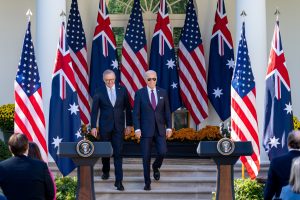Australia’s primary security problem is an emotional one. Australia is a country so deeply unsure of itself that it exists in a constant state of anxiety about its place in the world, and in particular over its strategic relationship with the United States. Illustrating these anxieties, this week Australian Trade Minister Don Farrell made what should have been an innocuous comment about who was Australia’s closest ally that sent the country into an existential meltdown.
Farrell was answering questions in the Senate on behalf of Foreign Minister Penny Wong, and was queried about why Australia wasn’t acting in concert with “our most trusted international partner” – the United States – by restoring funding to the main aid agency in Gaza when Washington had yet to do so. The question itself was one that demonstrated Australia’s lack of confidence as an independent country capable of making its own decisions.
In response, Farrell pondered that he wasn’t sure whether the U.S. was Australia’s most trusted ally, and that he thought this title would probably be reserved for New Zealand. The key word for Farrell – and for Australia as a whole – was “trusted.” It was a word Farrell was right to take issue with.
Now, there could be a contest over what constitutes an ally. Do alliances need to be tied to capabilities? Clearly the United States is a more capable state than New Zealand, and in a crisis a phone call to Washington is going to be far more useful than one to Wellington. But in terms of institutional integration, long-standing friendship, and cultural affinity New Zealand is undoubtedly Australia’s closest and most trusted partner. The wailing and gnashing of teeth that such an obvious statement of fact elicited was frankly absurd.
Yet, these reactions tell us something about the position Australia currently finds itself in. A “great and powerful friend” has always been a central pillar of Australia’s foreign policy, but at present this friend isn’t particularly reliable. Australia has previously been able to trust the United States regardless of which party held the presidency and controlled Congress, but this is no longer the case. The Republican Party has become a party that no longer shares Australia’s values, and as a result cannot be trusted to adhere to established elements of U.S. foreign policy. Its hostility toward democracy also presents a globally destabilizing force.
There are those in Australia who fear being upfront about this reality, and those who wish to simply bury their heads in the sand. There is also a much smaller group who see the chaotic designs of Donald Trump and the Republican Party as a net positive. However, most Australians are deeply suspicious of such chaos and instability.
Stability for Australia has always been a commitment to long-standing relationships – which is why Farrell’s statement caused such anguish. To many it felt like admitting something Australia shouldn’t. Even if New Zealand is clearly a much closer partner, Australians should still have to pay lip service to the U.S. holding the title of closest ally. Although in doing so I think Australia may have overestimated just how much attention Washington actually pays to Australia, and may also have been projecting a childish game of ranking friends onto them.
Farrell’s comments about trust have come on the back of increasing anxiety over the AUKUS agreement. The agreement has now become one of the great paradoxes of Australian foreign policy. The country undoubtedly needs greater capabilities across all sectors – not just defense – to become more independent (and emotionally secure). Yet in order to gain these capabilities it is reliant on a country that may be incapable of delivering them, either through a lack of shipbuilding capabilities or through any potential new foreign policy calculations of the Republican Party should Trump regain the presidency.
Trump 2.0 will not simply be something Canberra can ride out for four years like his first term given the growth of his resentment, the extremism of his movement, and the acceptance within the Republican Party of the January 6 assault on the Capitol building as a legitimate action. There will be far more norms and rules being broken should Trump return to the White House, many of which will be long-standing foreign policies.
But just as Europe is now being forced to seriously contemplate its own security problems with the prospect of a United States that lacks commitment to both Ukraine and NATO, Australia also needs to confront what it may mean to be able to trust the U.S. less. It isn’t a sign of betrayal to do so, as those mired in week’s hysteria may have believed, but instead the sign of an emotionally mature country that thinks seriously about its strategic circumstances.

































